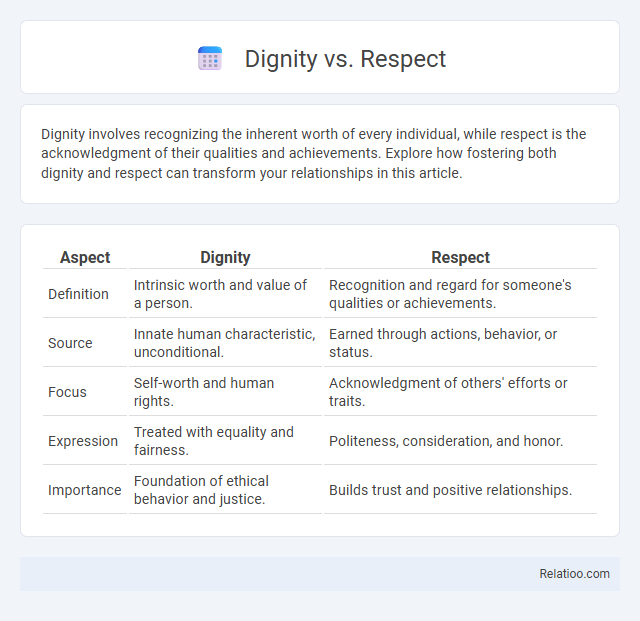Dignity involves recognizing the inherent worth of every individual, while respect is the acknowledgment of their qualities and achievements. Explore how fostering both dignity and respect can transform your relationships in this article.
Table of Comparison
| Aspect | Dignity | Respect |
|---|---|---|
| Definition | Intrinsic worth and value of a person. | Recognition and regard for someone's qualities or achievements. |
| Source | Innate human characteristic, unconditional. | Earned through actions, behavior, or status. |
| Focus | Self-worth and human rights. | Acknowledgment of others' efforts or traits. |
| Expression | Treated with equality and fairness. | Politeness, consideration, and honor. |
| Importance | Foundation of ethical behavior and justice. | Builds trust and positive relationships. |
Understanding Dignity and Respect
Dignity reflects the inherent worth and value every person possesses, while respect involves recognizing and honoring that inherent worth through actions and behavior. Understanding dignity requires acknowledging the fundamental human rights and intrinsic value within each individual, whereas respect is demonstrated by how you treat others in acknowledgment of their dignity. Ensuring your interactions uphold both dignity and respect fosters meaningful connections and a positive social environment.
Defining Dignity: Core Concepts
Dignity embodies an inherent value and worth intrinsic to every individual, independent of external recognition or status. Respect involves acknowledging this inherent dignity through actions and attitudes that honor another person's rights, feelings, and autonomy. Understanding dignity as an essential human quality emphasizes the fundamental ethical obligation to treat all individuals with fairness, empathy, and recognition of their intrinsic worth.
What Does Respect Truly Mean?
Respect truly means acknowledging the inherent worth and individuality of others, valuing their opinions, feelings, and rights without judgment or discrimination. It fosters mutual understanding, promotes positive interactions, and strengthens relationships by honoring personal boundaries and cultural differences. Unlike dignity, which reflects an intrinsic quality of being worthy, respect is an active expression that must be earned, given, and maintained through consistent behavior and attitudes.
Key Differences Between Dignity and Respect
Dignity refers to the inherent worth and value every person possesses simply by being human, while respect is the recognition and esteem you show towards someone's qualities, achievements, or position. Your dignity remains constant regardless of external opinions, whereas respect can vary depending on behavior or context. Understanding these differences helps foster meaningful interpersonal relationships and promote positive social interactions.
Why Dignity Matters in Human Interaction
Dignity matters in human interaction because it recognizes the inherent worth of every individual, fostering mutual respect and ethical behavior. Respect alone may acknowledge actions or roles, but dignity emphasizes intrinsic value beyond external factors, creating a foundation for empathy and equality. Prioritizing dignity enhances constructive communication, reduces conflicts, and promotes a more inclusive and humane society.
The Role of Respect in Building Relationships
Respect plays a crucial role in building relationships by acknowledging the inherent worth and feelings of others, fostering trust and open communication. While dignity refers to the intrinsic value every person holds, respect involves actively recognizing and honoring that value through considerate actions. Your ability to consistently show respect strengthens connections and promotes positive, lasting interactions.
Dignity in the Workplace: Ensuring Fair Treatment
Dignity in the workplace emphasizes employees' intrinsic worth, fostering an environment where fair treatment is paramount and workplace policies uphold equal opportunities without discrimination. Respect involves acknowledging individual contributions and valuing diverse perspectives, but dignity extends beyond this by ensuring fundamental rights and ethical standards are maintained for all staff. Prioritizing dignity drives organizational culture towards inclusion, equitable practices, and psychological safety, which enhances employee satisfaction and productivity.
Cultivating Respect Across Cultures
Cultivating respect across cultures requires understanding the nuanced differences between dignity and respect, where dignity represents an inherent value every individual possesses, while respect is the expression of regard toward that value. Intercultural competence involves recognizing diverse cultural norms and practices that shape how respect is conveyed, emphasizing empathy and active listening to honor intrinsic dignity in every interaction. Implementing culturally sensitive communication strategies fosters inclusive environments that uphold both dignity and genuine respect, enhancing global collaboration and social cohesion.
Common Misconceptions: Dignity vs Respect
Dignity and respect are often confused, but they represent distinct concepts: dignity is an inherent value every person possesses, while respect is the acknowledgment or expression of that value through actions and attitudes. Many mistakenly believe respect can be demanded, yet it must be earned, whereas dignity is an unalienable right you hold regardless of external treatment. Understanding this clarifies how your inherent dignity should never be compromised, even when respect is withheld.
Fostering Environments of Both Dignity and Respect
Fostering environments of both dignity and respect involves recognizing the inherent worth of every individual while actively honoring their perspectives and contributions. Dignity refers to the intrinsic value that demands ethical treatment, whereas respect emphasizes acknowledging others' rights, feelings, and experiences in interactions. Creating such environments promotes psychological safety, enhances collaboration, and supports inclusive cultures in workplaces and communities.

Infographic: Dignity vs Respect
 relatioo.com
relatioo.com